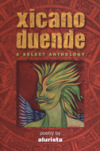xicano duende
In his introduction to this selection, editor and scholar Rigoberto González, after interrogating two previous “popular readings” of alurista’s work (note: throughout this review I am respectfully and enthusiastically attending to the poet’s own refusal to capitalize proper nouns) which define it both as “experimental” and “radiat[ing] from an Amerindian consciousness,” declares alurista to be a “political poet.” González is really doing nothing more than extrapolating upon merging the two readings together as one and expanding the argument for the notable worth of alurista’s work, but his point nonetheless is well taken.
In his introduction to this selection, editor and scholar Rigoberto González, after interrogating two previous “popular readings” of alurista’s work (note: throughout this review I am respectfully and enthusiastically attending to the poet’s own refusal to capitalize proper nouns) which define it both as “experimental” and “radiat[ing] from an Amerindian consciousness,” declares alurista to be a “political poet.” González is really doing nothing more than extrapolating upon merging the two readings together as one and expanding the argument for the notable worth of alurista’s work, but his point nonetheless is well taken.
Whatever else, alurista’s poems are border poems, and the use of “border” here doesn’t infer just the political/geographical/cultural/linguistic zone between the United States and Mexico, but all such dynamic locations of rich exchange, both inner and outer. Reading alurista offers opportunity to engage with what happens in these in-between locales as concerns national and cultural identity, formations of the personal—traveling spaces of language and thought where the sense of identity in language is often in flux. The poems catch at a lively blend of references that are in the air, presenting to the reader’s ear a juxtaposition of details easily missed if not attended to.
As in the poem “no prophet”:
no prophet
certainly no king
no luther, martin
or christ or brown
alurista’s word play is quite clever, jumbling spiritual figures throughout centuries of time, but it is also pointed. He continues:
nail the bankers
free the interest
free thy greed creed
creedgreed greeting
card upon graduation
to deliver us to credit
His line breaks function in a hip manner, jarring expectation and sweetening the overall effect of his message:
reap what u sow
malcolm, kennedy
and zapata died
chávez died peacefully
without boxing gloves
or golden belts
jackson prevails
bush burns and quail hides
Here at the ending of the poem, alurista, as Gonzalez notes, “mines” the words for all their worth, displaying just how ingenious his poems are. While alurista’s work doesn’t require footnotes, it does demand readers be nonetheless attentive. Be they historical or cultural, figures and ideas are consistently being put at play and transformed as well as commented upon. As is seen in “the prophet,” the breadth and scope of such play transcends eras and ethnicities.
Although alurista writes with a strong sense of his own Chicano-ness, he’s not limited in any way by it, and neither are his poems. Even if writing bilingually, which is oftener than not, alurista makes it clear he is remaining true to the demands made by the poem prior to those of any other association, personal or otherwise. He’s poet through and through.
dentro de nuestro Corazón
blood flows at an even pace
and all violent rivers
return to the calm
of deep oceanos
social change in uncle sam’s organization
band-aids wounds
y niega la sangre derramonda
(“mar de sangres”)
The rhythm of these lines matches what’s being said, how actively the flow in and out of the “heart” is engaged with and duplicated, the verbal pumping of the muscle pulsing along. alurista repeatedly engages the work of poetry in a fashion which is as moving as it is convincing.
If there is a cause to be found in his poems, it’s the liberation of poetry from page versus non-page aesthetics. Doing away with distinctions between spoken word or hip-hop and what is bound between wrappers, alurista opens the field up. Let’s have more of this:
death does not haunt me there is
no disguise to my desire
we are borderless
(“u know poetry”)
When you’re a poet as alurista is and you’re busy living, as you should be, whatever poems get written are just as equally busy with the same living. Sometimes that living is to be found in the spoken air and occasionally it’s on the page as well. Such a vibrancy that’s all too rare fills the best of alurista’s work. Alive and of the moment, his poems are out there. Look for them and get with them: it’s some of the better company not spoken of often enough and deserving of attention.





